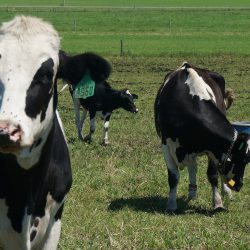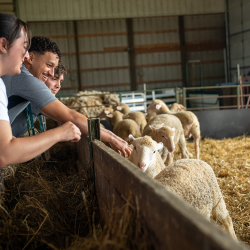ZEWA, the College of Veterinary Medicine’s zoo, exotics, wildlife, and aquatics club, is cultivating relationships inside and outside of the College to promote learning and connect those with zoo, exotics, wildlife, and aquatics interests. In 2023, ZEWA connected with Birds and Beaks Rescue and Rehab to facilitate wet labs — hands-on learning experiences for student veterinarians.

Hannah Williams, ZEWA exotics delegate, and Association of Avian Veterinarians (AAV) representative, met Shannon Dingee-Kramer, owner of Birds and Beaks, at the Parrot Behavior Conference ZEWA held in February of 2023. Guest speaker Dr. Irene Pepperberg — perhaps most well-known for her work with the African Grey Parrot, Alex — had requested a parrot for a workshop demonstration.
Dingee-Kramer remembers being thrilled. “The first term paper I ever wrote was about Alex and Dr. Pepperberg. Basically, Carlos Santana called to ask to borrow a guitar,” says Dingee-Kramer. She brought Jerky, her own African Grey Parrot to work with Dr. Pepperberg.
This provided an opportunity to officially introduce Birds and Beaks to ZEWA. With the support of Dingee-Kramer and the avian friends at Birds and Beaks, ZEWA members along with Dr. Jack Kottwitz, assistant professor at the College, began organizing wet labs.

“Working with Birds and Beaks gives students the unique opportunity to become familiar with birds not available to them in formal classes at the College. Every minute is a learning opportunity. We often shift topics on the fly during a lab — if there is a group of students with a specific interest in behavior or a species, we can spend the extra time on those topics versus being locked into a lesson plan,” says Kottwitz.

The wet labs are a mutually beneficial experience for students and the birds. “In the wet labs students are learning proper technique for toweling and handling the birds safely and with the least amount of stress possible. They are a great way for the students to get some hands-on training and experience with exotics. That’s vital when we have a notoriously low number of exotics veterinarians in Michigan,” says Dingee-Kramer.

“I feel it improves students’ understanding of the amount of exotic animals we’re dealing with at the rescue — and all that it takes to care for them. Hopefully, the experience will result in students pursuing the avian certification for their doctor of veterinary medicine degrees. At the very least, it will help them feel comfortable seeing birds in their practices as they are going out into the world,” she continues.
Williams herself is hoping to take her learning experiences from these wet labs forward into a mixed practice once she graduates.
A Peek at Birds and Beaks:
“We got started because as a ‘bird person,’ people kept coming to me to solve their avian problems. After the company I worked for was sold and I found myself jobless, I took a job at a startup and talked to my husband about opening a small parrot rescue. That was in 2015-2016.
We operated out of my home and converted a two-car garage into an aviary – and it still wasn’t enough. In July of 2022, we bought the new facility and have been working to make it our new home for the rescue.
Our mission is critical because parrots can live between 30 and 80 years depending on the species. Occasionally, we see the novelty purchase of a bird for a child or people who don’t understand what they’re getting into. However, the real volume of birds we see are usually outliving their humans, or their humans become terminally ill and don’t have successors to pass them on to.
At present, we have 189 parrots, everything from budgies, cockatiels, conures, amazon parrots, Quaker parrots, macaws, cockatoos, eclectus and African grey parrots, and more. We almost always have a 30-bird waitlist to get in.
We aren’t funded like Humane Societies. We are funded only by our adoption fees and fundraising efforts. We opened an LLC to make things to help support the rescue with that revenue. Our superpower is education. Education keeps more birds in their present homes than anything else. We teach about proper diet, proper training, how to problem-solve with birds, and we do so for free on social media every chance we get.” - Shannon Dingee-Kramer, owner of Birds and Beaks, @birdsandbeaksnation.



